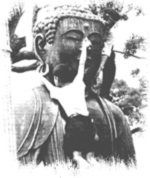Applied Psychoanalysis > Religions |
Psychoanalytic View on Religion
 |
The religion approach of Freud and psychoanalysis may be classified into three main aspects:
1 To the question what is religion, psychoanalysis answers: a collective neurosis; 2. The religious practice of the individuals resembles the symptoms of the obsessional neurosis;
3 There's a part of religion which we call superstition. Superstition too is linked by Freud with the unconscious motives.
1. The first feature - that is, religion as a collective neurosis - is derived from the obvious observation that all adult humans are fearing the power of nature/destiny, and in this respect try
to defend him/herself through reviving the early childhood experience of the almighty father. This natural father, endowed with unlimited power, is sanctified later and transformed in God (or Heavenly Father). This regression of
the adult person to the childhood experience of a powerful father and to the expectations of that period may be called neurotic. As long as this urge to revive the ancient relationship with the
natural father is universal, we may call it collective neurosis. 2. Freud noticed during his clinical treatments that obsessional patients believe and did things much like those believed and
done by religious believers/adepts. This is the individual neurosis of religious people who develop the same symptoms like the disturbed persons. This similarity is still confirmed today.
3. As for the superstition, Freud himself fought a great deal against it. We know of his believe in those schema of vital periodicity - inspired by his friend Fliess - applied to the
events of life, that is, about his countless arithmetical operation trying the determine the exact date of his death. Still Freud approach superstition with the insight draw from his
experience with the obsessive neurosis. He wrote in this respect:
Anyone who has had the opportunity of studying the hidden mental impulses of human beings by means of psychoanalysis can also say something new about the quality of the unconscious motives that find expression
in superstition. It can be recognized most clearly in neurotics suffering from obsessional thinking or obsessional states - people who are often of high intelligence - that superstition derives from suppressed
hostile and cruel impulses. Superstition is in large part the expectation of trouble; and a person who has harboured frequent evil wishes against others, but has been brought up to be good and has therefore repressed
such wishes into the unconscious, will be especially ready to expect punishment for his unconscious wickedness in the form of trouble threatening him from without. (Psychopathology of Everyday Life, 1901.)
Finally, one can endeavor to compare psychoanalysis and religion just to discover how different they are. Psychoanalysis should be ranged in the realm of science - thus, it is built on careful observation of natural facts,
inference and theorizing on them. Religion starts from visions and revelation which are not common ground for scientific method. Furthermore, in Freud's view, religion "is an attempt to master the sensory
world in which we are situated by means of the wishful world which we have developed within us as a result of biological and psychological necessities." (New Introductory Lectures on Psychoanalysis, 1933.)
Papers on this topic
<=
Back to the Applied Psychoanalysisor to the
Home pageCopyright 2002-2025, AROPA. All rights reserved.